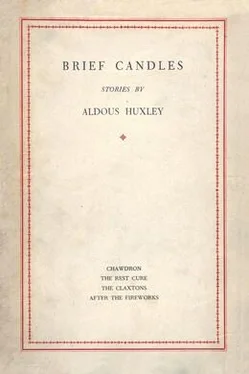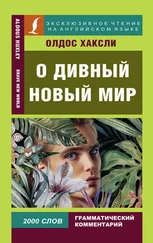At half past nine she left the dining–room, and the talk would come back to ulcers and Reality and Emergent Evolution.
‘One would like to keep her as a pet,’ John Tarwin had said as the door closed behind her on that first occasion he dined at Sir Watney’s.
Professor Broadwater agreed. There was a little silence. It was Tarwin who broke it.
‘What’s your feeling,’ he asked, leaning forward with that expression of blank intelligence on his eager, sharp–featured face, ‘what’s your feeling about the validity of experiments with artificially grafted tumours as opposed to natural tumours?’
Tarwin was only thirty–three and looked even younger among Sir Watney’s veterans. He had already done good work, Sir Watney explained to his assembled guests before the young man’s arrival, and might be expected to do much more. An interesting fellow too. Had been all over the place—tropical Africa, India, North and South America. Well off. Not tied to an academic job to earn his living. Had worked here in London, in Germany, at the Rockefeller Institute in New York, in Japan. Enviable opportunities. A great deal to be said for a private income. ‘Ah, here you are, Tarwin. Good evening. No, not at all late. This is Mr Justice Gidley, Professor Broadwater, Professor Stagg and—bless me! I hadn’t noticed you, Moira; you’re really too ultramicroscopic—my granddaughter.’ Tarwin smiled down at her. She was really ravishing.
Well, now they had been married five years, Moira was thinking, as she powdered her face in front of the looking–glass. Tonino was coming to tea; she had been changing her frock. Through the window behind the mirror one looked down between the cypress trees on to Florence—a jumble of brown roofs, and above them, in the midst, the marble tower and the huge, up–leaping, airy dome. Five years. It was John’s photograph in the leather travelling–frame that made her think of their marriage. Why did she keep it there on the dressing–table? Force of habit, she supposed. It wasn’t as though the photograph reminded her of days that had been particularly happy. On the contrary. There was something, she now felt, slightly dishonest about keeping it there. Pretending to love him when she didn’t … She looked at it again. The profile was sharp and eager. The keen young research student intently focused on a tumour. She really liked him better as a research student than when he was having a soul, or being a poet or a lover. It seemed a dreadful thing to say—but there it was: the research student was of better quality than the human being.
She had always known it—or, rather, not known, felt it. The human being had always made her rather uncomfortable. The more human, the more uncomfortable. She oughtn’t ever to have married him, of course. But he asked so persistently; and then he had so much vitality; everybody spoke so well of him; she rather liked his looks; and he seemed to lead such a jolly life, travelling about the world; and she was tired of being a mascot for her grandfather’s veterans. There were any number of such little reasons. Added together, she had fancied they would be the equivalent of the one big, cogent reason. But they weren’t; she had made a mistake.
Yes, the more human, the more uncomfortable. The disturbing way he turned on the beautiful illumination of his smile! Turned it on suddenly, only to switch it off again with as little warning when something really serious, like cancer or philosophy, had to be discussed. And then his voice, when he was talking about Nature, or Love, or God, or something of that sort—furry with feeling! The quite unnecessarily moved and tremulous way he said Good–bye! ‘Like a Landseer dog,’ she told him once, before they were married, laughing and giving a ludicrous imitation of his too heart–felt ‘Good–bye, Moira.’ The mockery hurt him. John prided himself as much on his soul and his feelings as upon his intellect; as much on his appreciation of Nature and his poetical love–longings as upon his knowledge of tumours. Goethe was his favourite literary and historical character. Poet and man of science, deep thinker and ardent lover, artist in thought and in life—John saw himself in the rich part. He made her read Faust and Wilhelm Meister . Moira did her best to feign the enthusiasm she did not feel. Privately she thought Goethe a humbug.
‘I oughtn’t to have married him,’ she said to her image in the glass, and shook her head.
John was the pet–fancier as well as the loving educator. There were times when Moira’s childishnesses delighted him as much as they had delighted Sir Watney and his veterans, when he laughed at every naïveté or impertinence she uttered, as though it were a piece of the most exquisite wit; and not only laughed, but drew public attention to it, led her on into fresh infantilities and repeated the stories of her exploits to anyone who was prepared to listen to them. He was less enthusiastic, however, when Moira had been childish at his expense, when her silliness had in any way compromised his dignity or interests. On these occasions he lost his temper, called her a fool, told her she ought to be ashamed of herself. After which, controlling himself, he would become grave, paternal, pedagogic. Moira would be made to feel, miserably, that she wasn’t worthy of him. And finally he switched on the smile and made it all up with caresses that left her like a stone.
‘And to think,’ she reflected, putting away her powder–puff, ‘to think of my spending all that time and energy trying to keep up with him.’
All those scientific papers she had read, those outlines of medicine and physiology, those textbooks of something or other (she couldn’t even remember the name of the science), to say nothing of all that dreary stuff by Goethe! And then all the going out when she had a headache or was tired! All the meeting of people who bored her, but who were really, according to John, so interesting and important! All the travelling, the terribly strenuous sight–seeing, the calling on distinguished foreigners and their generally less distinguished wives! It was difficult for her to keep up even physically—her legs were so short and John was always in such a hurry. Mentally, in spite of all her efforts, she was always a hundred miles behind.
‘Awful!’ she said aloud.
Her whole marriage had really been awful. From that awful honeymoon at Capri, when he had made her walk too far, too fast, uphill, only to read her extracts from Wordsworth when they reached the Aussichtspunkt ; when he had talked to her about love and made it, much too frequently, and told her the Latin names of the plants and butterflies—from that awful honeymoon to the time when, four months ago, her nerves had gone all to pieces and the doctor had said that she must take things quietly, apart from John. Awful! The life had nearly killed her. And it wasn’t (she had come at last to realize), it wasn’t really a life at all. It was just a galvanic activity, like the twitching of a dead frog’s leg when you touch the nerve with an electrified wire. Not life, just galvanized death.
She remembered the last of their quarrels, just before the doctor had told her to go away. John had been sitting at her feet, with his head against her knee. And his head was beginning to go bald! She could hardly bear to look at those long hairs plastered across the scalp. And because he was tired with all that microscope work, tired and at the same time (not having made love to her, thank goodness! for more than a fortnight) amorous, as she could tell by the look in his eyes, he was being very sentimental and talking in his furriest voice about Love and Beauty and the necessity for being like Goethe. Talking till she felt like screaming aloud. And at last she could bear it no longer.
Читать дальше



![Олдос Хаксли - О дивный новый мир [Прекрасный новый мир]](/books/11834/oldos-haksli-o-divnyj-novyj-mir-prekrasnyj-novyj-thumb.webp)






